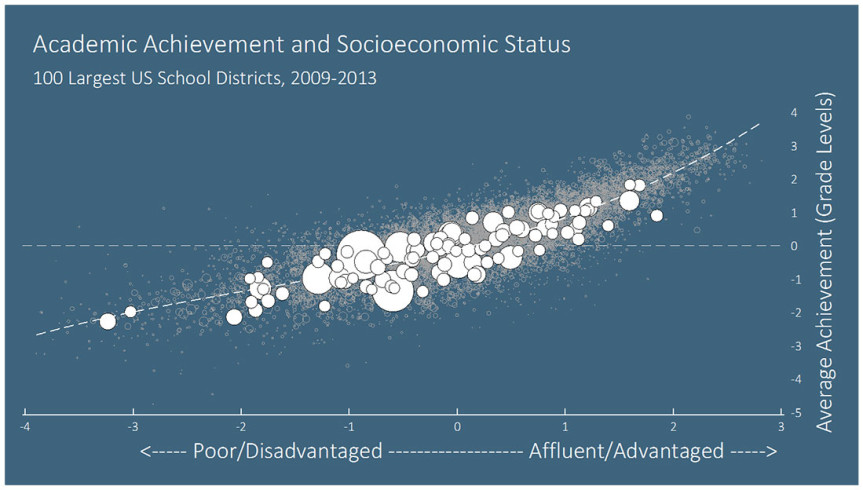Oakland’s raucous debate around including all public schools—charters and district-run in a single enrollment system—is literally much ado about nothing. Common enrollment will not happen in the short term in Oakland—the politics are too hot, and the real beneficiaries, Oakland parents stranded without satisfactory neighborhood schools are relegated to the sidelines. The debate dominated by interest groups narrowly pursuing interests.
I know that some see common enrollment as some stealthy charter conspiracy. You are wrong, charters don’t want to hand their enrollment to the district, and I think you will be lucky to see more than a handful of charters coming out for the proposal. Nor would I expect the charter association, the statewide advocacy group, to support common enrollment, as it sacrifices school autonomy.
On the “other side” are supporters of district-run schools, who believe that common enrollment will draw more students away from district schools, undermining the district’s financial stability. So, yeah looking purely from self- interest of the professionals, common enrollment makes little sense.
It does make sense to parents though, but they will be squeezed by each “side” and likely lose. The only survey I have seen, which is admittedly unscientific, but is a relatively unbiased statement, is copied below
“Would you prefer to only have to complete one application and enrollment process for all public schools in Oakland (District and Charter)?”, overwhelmingly showed that families wanted this—Yes (316) 73.3%, No (115) 26.7%.
And note that the survey overrepresented OUSD district-run school parents. Roughly a quarter of Oakland families attend a charter, while only 7% of survey respondents did. Here are the respondents. I have a child/children in an OUSD District school. (368) 83.3% I have a child/children in an OUSD Charter school. (30) 6.8% I have a child/children attending a private school in Oakland. (40) 9% I have a child/children who will be school aged in the future. (72) 16.3% I have a child/children who have graduated/left OUSD. (29) 6.6%
If anyone has better, more representative data, I would love to see it and include it. If not, I am not sure what the argument is against common enrollment, from a parent’s perspective; that Oakland families don’t understand what they want?
Better Enrollment
Even if common enrollment dies a premature death, OUSD should change and improve the enrollment process. Moving away from a paper system at one central site at Westlake is a good start.
We need regional, culturally competent, neighborhood centers that work with and through community based organizations. I can imagine new neighborhood based storefronts as well as a set of pop up enrollment centers on mobile laptop carts, rolling out to preschools, churches and community centers, led by folks from the community.
And as we analyze academic growth, and include a range of school culture indicators in the district balanced scorecard, we should be able to provide better information to parents, to help them get the right fit. And let’s disaggregate data so families can understand how subgroups are doing and what services are available at what sites.
Technology helps with this in other industries. Think Eharmony, Farmersonly, and even Yelp. These are some of the most important decisions for families and they are made on some of the thinnest information, with our most underserved parents tending to exercise the least effective choices. Resultingly our most highly impacted children are increasingly concentrated in schools of default.
That seems to me the “real” problem. Common enrollment was a proposed strategy to address it.
What Equity Requires
Common enrollment grew as part of the Equity Pledge. We need an “equity pledge” because the dynamics of current system work against equity. The myriad of individual choices that families (quite justifiably in my opinion) make to give their child the best chance can have the effect of reducing opportunities for other families. And we need to make a pledge because making the system fairer may actually hurt individual actors or schools.
Talking to families, I think there is real support for common enrollment, but I honestly don’t know. I also think a well-designed common enrollment process could expand opportunity and increase equity. But again I really don’t know.
But neither does anyone else, and nobody can claim to speak for families until they broadly ask them. And, if not common enrollment, then what?
Assigning schools largely on segregated housing patterns is sure to reinforce segregation, privilege, and disadvantage. I really think most folks are honest in this debate and want more equity. So if not common enrollment how do we increase the access to higher quality schools for underserved families?
If common enrollment is resisted and rejected, then what is next? The current dynamics are predictable, and to silently allow them to continue is the real atrocity.

